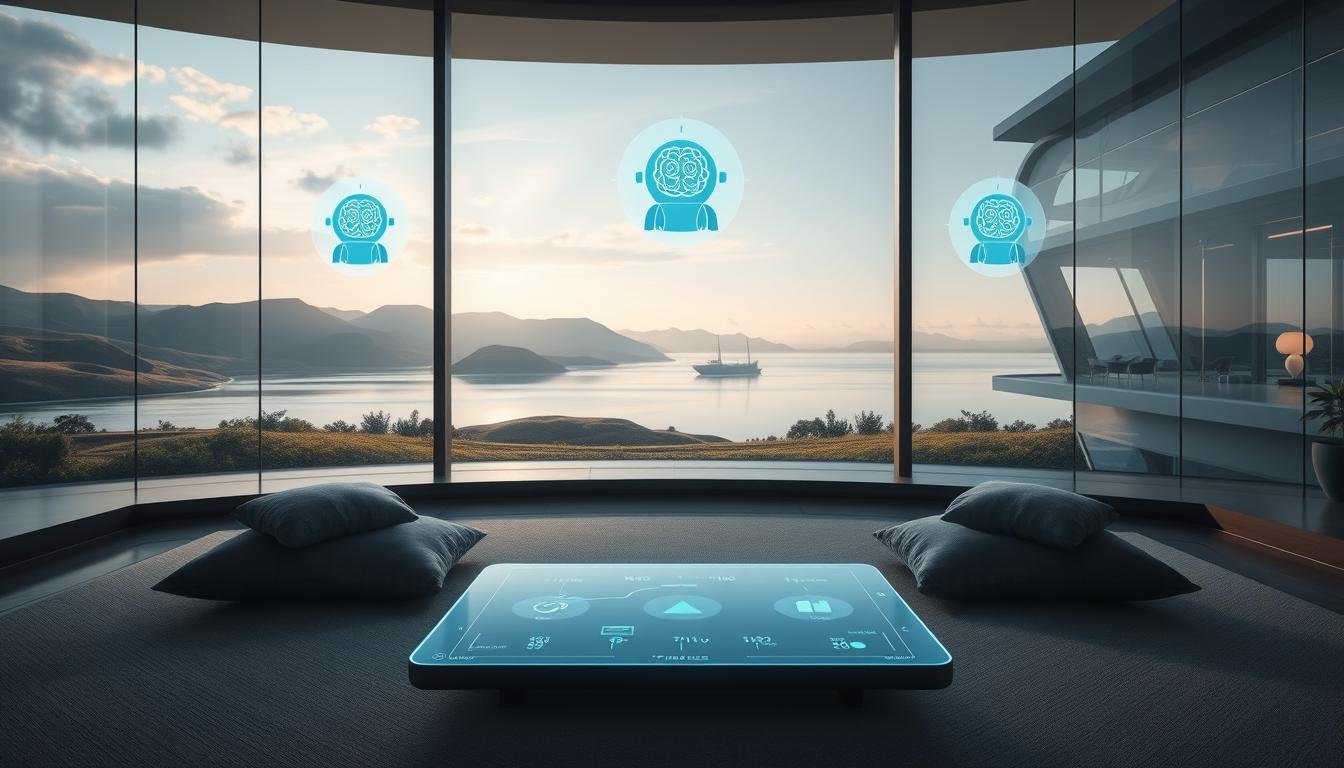Harnessing AI to Boost Your Mental Wellness
Imagine having a supportive companion available 24/7 to help navigate life’s challenges. This isn’t a fantasy—it’s the reality AI is creating for mental wellness. From chatbots offering immediate support to systems detecting early signs of burnout, AI is revolutionizing how we approach mental health care1.
Recent advancements in AI, such as natural language processing and machine learning, are enabling early risk detection and personalized interventions. For instance, AI can analyze speech patterns to identify depression or anxiety, providing timely support2. This technology isn’t just theoretical; it’s already in use. Tools like Woebot employ cognitive-behavioral techniques, accessible anytime, to assist users1.
The integration of AI in mental wellness is a rapidly evolving field. Studies highlight AI’s potential to reduce health disparities and improve access to care, making mental health support more equitable3. As we move forward, the focus remains on combining technological advancements with human compassion to create a holistic approach to mental wellness.
This article explores how AI is transforming mental health care, from early detection to innovative treatment options. We’ll delve into the latest research and real-world applications, showing how AI is making mental wellness more accessible and effective than ever before.
Understanding the Convergence of Technology and Mental Health
The integration of advanced technology into mental health care is reshaping traditional practices, offering innovative solutions for diagnosis, treatment, and patient support. Tools powered by machine learning analyze symptoms from electronic health records, enabling early detection of conditions like depression and anxiety4. This proactive approach allows for timely interventions, improving patient outcomes significantly.
Real-time data plays a crucial role in supporting early intervention strategies. For instance, AI systems can predict patient responses to different therapeutic modalities more accurately than traditional methods5. This capability enhances treatment effectiveness and reduces the risk of misdiagnosis, a common issue in mental health care.
Recent studies highlight the effectiveness of digital tools in mental health. AI-powered platforms like Woebot and Wysa provide cost-effective alternatives to traditional therapy, making mental health support more accessible6. These tools demonstrate how technology can bridge gaps in care, especially for underserved populations.
The shift towards digital mental health care is both necessary and inevitable. As technology continues to evolve, it offers solutions to longstanding challenges in mental health care delivery. By embracing these advancements, we can create a more equitable and effective system for all patients.
Evolution of Artificial Intelligence in Healthcare
The journey of artificial intelligence in healthcare began with the Dartmouth Workshop in 1956, where the term “AI” was first coined. This milestone marked the start of exploring how machines could simulate human thought processes. By the 1980s, expert systems emerged, mimicking decision-making abilities in specific domains. These early systems laid the groundwork for more advanced applications in health care.
In the 1990s, the introduction of neural networks brought significant progress. These networks, inspired by the human brain, could learn from data, making them invaluable in pattern recognition tasks. A breakthrough came with IBM’s Watson, which demonstrated AI’s potential in analyzing complex medical data. This evolution from rudimentary algorithms to sophisticated machine learning has been transformative.
Modern advancements in machine learning have enabled AI to address intricate challenges in mental health care. For instance, AI systems can now analyze speech patterns to detect early signs of depression or anxiety, providing timely support7. Tools like Woebot employ cognitive-behavioral techniques, offering assistance anytime, which has been shown to be effective in clinical studies.
The integration of AI in mental wellness is rapidly advancing. Studies highlight AI’s potential to reduce health disparities and improve access to care, making mental health support more equitable8. As we move forward, the focus remains on combining technological advancements with human compassion to create a holistic approach to mental wellness.
Recent research underscores the impact of AI in early risk detection. For example, a study published in January in the journal Nature indicates that patients accepted AI technology and found it a safe form of psychotherapy9. Additionally, tools like Limbic’s e-triage system have shown a 45% reduction in changes to treatment due to improved accuracy, and a 93% accuracy rate across common mental health disorders8.
These advancements not only enhance treatment outcomes but also improve system efficiency. Eleos Health’s technology, for instance, reduces provider documentation time by over 50% and doubles client engagement, resulting in better care outcomes9. Such examples illustrate the pivotal role of evolving AI in mental health care.
Understanding this evolution is crucial for appreciating current innovations. From early experiments to modern deep learning, AI has come a long way. As technology continues to evolve, it offers solutions to longstanding challenges in mental health care delivery. By embracing these advancements, we can create a more equitable and effective system for all patients.
Innovative AI-Powered Mental Health Tools
Modern AI tools are revolutionizing mental health care through innovative features and personalized support. Chatbots like Woebot and Tess use natural language processing to detect early signs of mental health issues, offering timely interventions10. These tools provide accessible support, helping users manage conditions like anxiety and depression effectively.
Wearable technology, such as Biobeat, integrates AI to monitor vital signals, enabling early detection of potential mental health issues11. This predictive capability allows for timely interventions, enhancing treatment outcomes and continuous monitoring. Such tools contribute significantly to personalized care, ensuring individuals receive the support they need.
Studies show that AI-powered platforms like Tess can reduce mental health symptoms by up to 40% in just two weeks of daily use12. These innovations are redefining self-care, making mental health support more accessible and effective than ever before.
AI and Mental Wellness: Transforming Self-Care Approaches
AI is revolutionizing self-care by offering personalized mental health solutions that are accessible anytime, anywhere. Recent reviews, such as those in JAMA Psychology, reveal that AI-driven platforms can reduce dependency on medications and introduce personalized therapeutic alternatives13.
These tools are shifting self-care paradigms by personalizing therapy and treatment planning. For instance, AI-powered chatbots adapt to individual needs, offering tailored interventions that improve patient outcomes14. This personalized approach ensures that each individual receives care that is specific to their needs, enhancing the effectiveness of treatment plans.
Research demonstrates that AI interventions lead to improved patient outcomes, with some studies showing a reduction in mental health symptoms by up to 40% in just two weeks of daily use. These innovations are making mental health support more accessible and effective than ever before.
By integrating AI with traditional treatment approaches, we can create a holistic approach to mental wellness. This combination not only enhances treatment outcomes but also improves system efficiency, making mental health care more equitable and effective for all patients.
Predictive Analytics and Early Detection Strategies
Predictive analytics is transforming mental health care by enabling early detection of risks and improving intervention timing. Machine learning models analyze electronic health records and symptoms to forecast potential issues, such as cognitive impairment or suicide risk, with remarkable accuracy15.
Studies demonstrate that AI-based screening tools can detect mental disorders early, often before symptoms become severe. For instance, AI systems have shown a 93.5% accuracy rate in identifying suicidal ideation and a 91.2% accuracy rate for depressive episodes16. These tools flag high-risk patients, allowing clinicians to intervene sooner.
Digital data analysis plays a crucial role in enhancing care outcomes. AI systems process vast amounts of information, enabling timely and accurate predictions. For example, one model achieved an overall accuracy of 89.3% in detecting early signs of mental health crises, with a lead time of 7.2 days before human expert identification15.
Real clinical data underscores the benefits of early risk detection. AI-powered tools like Limbic’s e-triage system have achieved a 93% accuracy rate in diagnosing common mental illnesses16. These advancements not only improve patient outcomes but also save lives by enabling timely interventions.
Ethical Considerations and Bias in AI Applications
Ethical challenges arise as AI becomes integral to mental health care. A significant concern is algorithmic bias, which can perpetuate disparities among patients. Recent studies emphasize the need for fairness in AI systems to ensure equitable treatment outcomes17.
Research highlights that biased AI algorithms can lead to skewed results, affecting vulnerable populations. For instance, insufficient guardrails in AI development have resulted in unequal treatment recommendations18. These outcomes underscore the necessity of ethical oversight.
Collaboration between developers and clinicians is crucial to mitigate bias. Ethical practices, such as diverse datasets and transparency, are essential for fair AI systems. Regulatory suggestions from recent articles in JMIR and Health Policy Technol. stress the importance of accountability19.
Studies reveal that patient concerns about bias in AI systems are significant. For example, a large-scale survey showed that bias concerns had a mean score of 3.55, indicating a notable apprehension among participants18. These findings highlight the need for robust ethical frameworks.
Ensuring data privacy and fairness is paramount. Policy improvements should focus on transparent communication about AI’s purpose, risks, and benefits. This approach fosters trust and ensures ethical AI integration in mental health care17.

Personalizing Treatment Through AI Innovations
Personalized treatment plans are revolutionizing mental health care, thanks to AI innovations. These advancements enable tailor-made interventions that adapt to individual needs in real-time. By analyzing vast amounts of data, AI systems can detect subtle changes in a patient’s condition, allowing for precise adjustments to their care plan20.
Machine learning algorithms play a crucial role in refining therapeutic interventions. For instance, AI can analyze speech patterns and social media activity to identify early signs of depression or anxiety, providing timely support20. This proactive approach not only improves treatment outcomes but also enhances patient engagement and satisfaction.
Research highlights the effectiveness of personalized care, showing improved outcomes and reduced costs in behavioral health20. AI’s ability to integrate multiple data sources, such as electronic health records and wearable device data, allows for a more comprehensive understanding of each patient’s needs. This holistic approach ensures that interventions are targeted and effective, reshaping mental health care for the better.
The Role of Chatbots and Virtual Assistants in Mental Health Support
Chatbots and virtual assistants are becoming essential tools in mental health care, offering round-the-clock support and personalized interventions. These digital tools provide immediate access to mental health advice, which is crucial for individuals experiencing acute stress or anxiety21.
Traditional therapy often involves long wait times, with an average wait of 2-6 weeks for an appointment21. Chatbots offer a solution by delivering therapeutic interventions like cognitive behavioral therapy (CBT) and dialectical behavior therapy (DBT), which have been shown to effectively treat anxiety and depression21.
Studies indicate that 70% of individuals are more likely to seek help through anonymous online platforms, reducing the stigma associated with mental health care21. Chatbots can improve mental health outcomes by up to 30% when integrated with traditional therapy21.
These innovations provide a scalable solution to mental health care shortages, ensuring accessible and effective support for all patients. By integrating AI with mobile apps, chatbots offer personalized support, making mental health care more accessible and effective than ever before21.
Integration of Wearable Technology in Mental Health Care
Wearable technology is emerging as a groundbreaking tool in mental health care, offering new ways to monitor and manage conditions. These devices, such as Biobeat’s wearable sensors, track vital signs like heart rate variability and sleep patterns, providing crucial data for early intervention22.
Sensors and mobile applications collect and analyze data, enabling healthcare providers to detect early signs of mental health issues. For instance, wearables can identify reduced heart rate variability, often linked to depression, and monitor resting heart rates that may indicate stress22.
Research shows that wearables can enhance personalized treatment by tracking daily activities and social interactions. This continuous data collection helps identify trends, allowing for timely and targeted interventions22. For example, encouraging regular physical activity through wearables can improve mood and reduce depressive symptoms22.
By integrating wearables into care systems, we can detect mental health symptoms early and improve patient outcomes. This proactive approach makes mental health care more accessible and effective, ensuring better support for all patients.
Economic and Social Implications of AI in Mental Health
Economic and social dynamics significantly influence the adoption and impact of AI in mental health care. While AI offers innovative solutions, it also poses risks of widening disparities. Studies indicate that AI adoption can increase job stress, leading to burnout among employees23. This underscores the need for strategies to manage stress and foster self-efficacy in AI learning to mitigate negative effects on well-being23.
Research reveals that AI can reduce healthcare expenditure by $150 billion by 2026 in the U.S., making mental health care more affordable24. AI models have shown high accuracy in diagnosing psychiatric illnesses, achieving up to 90% effectiveness24. These advancements not only enhance care access but also create entrepreneurial opportunities, fostering community development.
However, the integration of AI must consider ethical and economic contexts to ensure equitable access. For instance, while AI reduces costs, its implementation could exacerbate disparities if not managed carefully. Therefore, stakeholders must weigh both the benefits and risks of AI in mental health care to create balanced policies.
Policy, Regulation, and Privacy in Digital Mental Healthcare
As digital mental health care evolves, significant policy gaps and privacy concerns arise. The estimated number of mental health apps available to consumers is between 10,000 and 20,000, yet many lack robust regulatory oversight25. For instance, BetterHelp, with approximately 2 million users, faced a data breach leading to FTC recommendations for partial compensation25. This highlights the urgent need for updated regulations to protect patient data.
Current legal frameworks like HIPAA are being challenged by the rapid integration of AI. In 2020, the US Department of Health and Human Services allowed healthcare providers to use audio and video technologies without HIPAA-related fines, but this temporary leniency doesn’t address long-term privacy concerns25. Many mental health apps are classified as “general wellness” tools, exempting them from FDA oversight under the 21st Century Cures Act, which raises safety monitoring issues25.
Recent legislation like Alabama’s SB 272 (2022) aims to enhance safety protocols for telehealth services while maintaining high standards of care26. The proposed Safe Patient Limits Act in Illinois reflects concerns about AI integration in healthcare, prioritizing traditional care models26. These efforts underscore the need for robust, forward-thinking regulations to ensure ethical care delivery.
Research emphasizes the importance of aligning technological development with ethical standards. A three-part soft law governance framework, including a code of conduct and third-party certification, has been suggested to enhance safety and privacy25. Ensuring privacy and minimizing bias are essential for maintaining trust in digital mental health care tools.
Emerging Trends and Research Directions in AI-Driven Mental Care
Recent advancements in AI are paving the way for groundbreaking innovations in mental health care. Institutions like Vanderbilt and the Alan Turing Institute are pioneering large-scale datasets to predict mental health issues in asymptomatic populations, setting the stage for early intervention strategies27.
Machine learning is emerging as a key tool in predicting therapeutic responses. For instance, AI systems can analyze speech patterns and social media activity to detect early signs of depression, enabling timely support27. This proactive approach not only improves treatment outcomes but also enhances patient engagement.
Studies highlight the effectiveness of AI-powered platforms like Tess, which can reduce mental health symptoms by up to 40% in just two weeks of daily use28. These innovations are redefining self-care, making mental health support more accessible and effective than ever before.
Research emphasizes the importance of integrating technology with traditional care models. AI’s ability to analyze vast amounts of data allows for personalized treatment plans, ensuring interventions are targeted and effective. This holistic approach is reshaping mental health care for the better29.
Continued investment in research and development is crucial for future breakthroughs. By combining technological advancements with human compassion, we can create a more equitable and effective system for all patients. The future of AI in mental health care is promising, with the potential to transform lives globally28.
Closing Perspectives on Empowering Mental Wellness with AI
As we look to the future, the fusion of technology and mental health care offers unprecedented opportunities for empowerment and healing. AI-driven tools have revolutionized mental health support, providing accessible solutions that adapt to individual needs. These innovations are transforming lives by offering personalized therapy and early detection of mental health issues30.
Research highlights the effectiveness of AI in mental health care. Studies show that AI-powered platforms can reduce mental health symptoms by up to 40% in just two weeks of daily use. Additionally, AI tools offer low-threshold access, geographic independence, and constant availability, making mental health support more accessible than ever before31.
Professionals and individuals alike must remain open to innovation while advocating for ethical, research-based policy improvements. By embracing a future where technology and compassionate care intertwine, we can create a more equitable and effective system for all patients. Let us harness the power of AI to empower mental wellness and inspire a healthier tomorrow30.
Share this content:




Post Comment